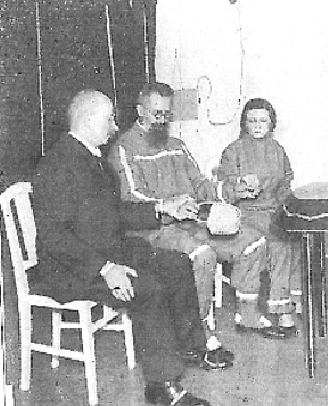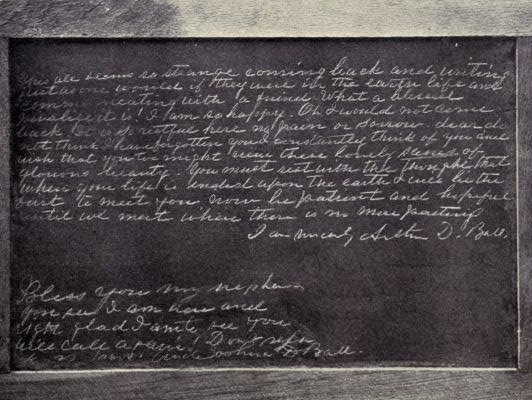|
Hodgson Report
''Report of the committee appointed to investigate phenomena connected with the Theosophical Society'', commonly called the Hodgson Report was an 1885 report by the Society for Psychical Research (SPR) on Helena Blavatsky and purportedly apported Mahatma Letters. History Richard Hodgson, a member of the SPR and a research worker of paranormal phenomena, was sent to India. Hodgson's task was to examine if the mode of appearance attributed to the Mahatma Letters represented genuine psychical phenomena. In December 1884 Hodgson arrived in Adyar. He eventually concluded that the evidence supported Emma Coulomb, and that various inconsistencies, misrepresentations, and provable falsehoods in sworn statements by certain Theosophical Society members destroyed their credibility. He included in his research examination of the physical spaces where phenomena had been reported, including architectural features that had been concealed or removed from their original placements. Hodgson wrot ... [...More Info...] [...Related Items...] OR: [Wikipedia] [Google] [Baidu] |
Society For Psychical Research
The Society for Psychical Research (SPR) is a nonprofit organisation in the United Kingdom. Its stated purpose is to understand events and abilities commonly described as psychic or paranormal. It describes itself as the "first society to conduct organised scholarly research into human experiences that challenge contemporary scientific models." It does not, however, since its inception in 1882, hold any corporate opinions: SPR members assert a variety of beliefs with regard to the nature of the phenomena studied. Origins The Society for Psychical Research (SPR) originated from a discussion between journalist Edmund Rogers and the physicist William F. Barrett in autumn 1881. This led to a conference on 5 and 6 January 1882 at the headquarters of the British National Association of Spiritualists, at which the foundation of the Society was proposed. The committee included Barrett, Rogers, Stainton Moses, Charles Massey, Edmund Gurney, Hensleigh Wedgwood and Frederic W. H. Myers. ... [...More Info...] [...Related Items...] OR: [Wikipedia] [Google] [Baidu] |
Helena Blavatsky
Helena Petrovna Blavatsky, uk, Олена Петрівна Блаватська, Olena Petrivna Blavatska (; – 8 May 1891), often known as Madame Blavatsky, was a Russian mystic and author who co-founded the Theosophical Society in 1875. She gained an international following as the leading theoretician of Theosophy. Born into an aristocratic family of Russian-German descent in Yekaterinoslav, then in the Russian Empire (now Dnipro in Ukraine), Blavatsky traveled widely around the empire as a child. Largely self-educated, she developed an interest in Western esotericism during her teenage years. According to her later claims, in 1849 she embarked on a series of world travels, visiting Europe, the Americas, and India. She also claimed that during this period she encountered a group of spiritual adepts, the "Masters of the Ancient Wisdom", who sent her to Shigatse, Tibet, where they trained her to develop a deeper understanding of the synthesis of religion, philosop ... [...More Info...] [...Related Items...] OR: [Wikipedia] [Google] [Baidu] |
Apport (paranormal)
In parapsychology and spiritualism, an apport is the alleged paranormal transference of an article from one place to another, or an appearance of an article from an unknown source that is often associated with poltergeist activity or séances. Apports reported during séances have been found to be the result of deliberate fraud. No medium or psychic has demonstrated the manifestation of an apport under scientifically controlled conditions. History A famous apport fraud is attributed to Charles Bailey (1870–1947). During a séance, Bailey produced two live birds out of thin air but was undone when the dealer who sold him the birds appeared in the crowd. Common objects that are produced are stones, flowers, perfumes, and animals. These objects are said to be "gifts" from the spirit(s). In March 1902 in Berlin, police officers interrupted a séance of the apport medium Frau Anna Rothe. Her hands were grabbed and she was wrestled to the ground. A female police assistant physicall ... [...More Info...] [...Related Items...] OR: [Wikipedia] [Google] [Baidu] |
Mahatma Letters
''The Mahatma Letters to A.P. Sinnett'' is a book published in 1923 by A. Trevor Barker. () According to Theosophical teachings, the letters were written between 1880 and 1884 by Koot Hoomi and Morya to A. P. Sinnett. The letters were previously quoted in several theosophical books (e.g. ''The Occult World'' by Sinnett), but not published in full. The letters were important to the movement due to their discussions on the theosophical cosmos and spiritual hierarchy. From 1939, the original letters were in the possession of the British Museum but later the British Library. The book was both praised and criticized by theosophists. Dr H. N. Stokes called the book "the most authoritative work of a theosophical nature ever made accessible to the public. It is simply transcendent in its importance." Criticism Max Müller (Indologist and philologist) wrote that if "Mrs. Blavatsky would have tried to confess openly her small faults and indiscretions, instead sending letters through the ... [...More Info...] [...Related Items...] OR: [Wikipedia] [Google] [Baidu] |
Richard Hodgson (parapsychologist)
Richard Hodgson (24 September 1855 – 21 December 1905) was an Australian-born psychical researcher who investigated spiritualist mediums such as Eusapia Palladino and Leonora Piper. During his later life, Hodgson became a spiritualist medium himself and believed to be in communication with spirits. Biography Hodgson was born in Melbourne, Australia on 24 September 1855 to Mr. R. Hodgson, leather merchant of Melbourne. He received a doctor of law degree in 1878 from the University of Melbourne. In the 1880s he moved to England to study poetry at St John's College, Cambridge. Hodgson met Henry Sidgwick his professor at Cambridge and became a member of the Society for Psychical Research (SPR) in 1882. Hodgson joined the American Society for Psychical Research in 1887 to serve as its secretary. Hodgson was sent by the SPR in 1884 to India to investigate Helena Blavatsky and concluded that her claims of psychic power were fraudulent. Among the phenomena that Hodgson investigated wa ... [...More Info...] [...Related Items...] OR: [Wikipedia] [Google] [Baidu] |
Theosophical Society
The Theosophical Society, founded in 1875, is a worldwide body with the aim to advance the ideas of Theosophy in continuation of previous Theosophists, especially the Greek and Alexandrian Neo-Platonic philosophers dating back to 3rd century CE. It also encompasses wider religious philosophies like Vedānta, Mahāyāna, Qabbalah, and Sufism. The Theosophical Society functions as a bridge between East and West, emphasizing the commonality of human culture. The term "theosophy" comes from the Greek ''theosophia'', which is composed of two words: ''theos'' ("god," "gods," or "divine") and ''sophia'' ("wisdom"). Theosophia, therefore, may be translated as "wisdom of the gods", "wisdom in things divine", or "Divine Wisdom". Locations The original organization, after splits and realignments, has several successors. Following the death of Helena Blavatsky, competition emerged between factions within the Society, particularly among founding members. The organization split into t ... [...More Info...] [...Related Items...] OR: [Wikipedia] [Google] [Baidu] |
Vernon Harrison
Vernon George Wentworth Harrison (14 March 1912 – 14 October 2001) was a president of the Royal Photographic Society, and a professional "research worker of disputed documents". Biography Harrison was born in Sutton Coldfield, Warwickshire, England in March 1912, to a schoolteacher father. Harrison was educated at Bishop Vesey's Grammar School, before reading Physics, Chemistry and Mathematics at the University of Birmingham. Subsequently, he undertook three years of postgraduate research in the Physics Department, studying in particular "the use of photography and photomicrography as recording media."Theosophical University Press Online: ''H. P. BLAVATSKY and the SPR: A ... [...More Info...] [...Related Items...] OR: [Wikipedia] [Google] [Baidu] |
Critical Reading
Critical reading is a form of language analysis that does not take the given text at face value, but involves a deeper examination of the claims put forth as well as the supporting points and possible counterarguments. The ability to reinterpret and reconstruct for improved clarity and readability is also a component of critical reading. The identification of possible ambiguities and flaws in the author's reasoning, in addition to the ability to address them comprehensively, are essential to this process. Critical reading, much like academic writing, requires the linkage of evidential points to corresponding arguments. As acknowledged by a number of scholars and wordsmiths, "...a story has as many versions as it has readers. Everyone takes what he wants or can from it and thus changes it to his measure. Some pick out parts and reject the rest, some strain the story through their mesh of prejudice, some paint it with their own delight."— John Steinbeck, ''The Winter of Our Discon ... [...More Info...] [...Related Items...] OR: [Wikipedia] [Google] [Baidu] |
Selection Bias
Selection bias is the bias introduced by the selection of individuals, groups, or data for analysis in such a way that proper randomization is not achieved, thereby failing to ensure that the sample obtained is representative of the population intended to be analyzed. It is sometimes referred to as the selection effect. The phrase "selection bias" most often refers to the distortion of a statistical analysis, resulting from the method of collecting samples. If the selection bias is not taken into account, then some conclusions of the study may be false. Types Sampling bias Sampling bias is systematic error due to a non-random sample of a population, causing some members of the population to be less likely to be included than others, resulting in a biased sample, defined as a statistical sample of a population (or non-human factors) in which all participants are not equally balanced or objectively represented. It is mostly classified as a subtype of selection bias, sometimes sp ... [...More Info...] [...Related Items...] OR: [Wikipedia] [Google] [Baidu] |
Séance
A séance or seance (; ) is an attempt to communicate with spirits. The word ''séance'' comes from the French word for "session", from the Old French ''seoir'', "to sit". In French, the word's meaning is quite general: one may, for example, speak of "''une séance de cinéma''" ("a movie session"). In English, however, the word came to be used specifically for a meeting of people who are gathered to receive messages from ghosts or to listen to a spirit medium discourse with or relay messages from spirits. In modern English usage, participants need not be seated while engaged in a séance. Fictionalised conversations between the deceased appeared in ''Dialogues of the Dead'' by George, First Baron Lyttelton, published in England in 1760. Among the notable spirits quoted in this volume are Peter the Great, Pericles, a "North-American Savage", William Penn, and Christina, Queen of Sweden. The popularity of séances grew dramatically with the founding of the religion of Spiritualis ... [...More Info...] [...Related Items...] OR: [Wikipedia] [Google] [Baidu] |
Seybert Commission
The Seybert Commission was a group of faculty members at the University of Pennsylvania who in 1884–1887 investigated a number of respected spiritualist mediums, uncovering fraud or suspected fraud in every case that they examined. Establishment of the Commission An ardent believer in Spiritualism, Henry Seybert left in his will funds for the establishment of an endowed chair in Philosophy at the University of Pennsylvania. As a condition to this bequest, he required that the University set up a commission to investigate "all systems of Morals, Religion, or Philosophy which assume to represent the Truth, and particularly of Modern Spiritualism." Ten men served on the commission, all of whom declared themselves at the outset to either be neutral or favorably disposed toward Spiritualism. Among the more notable members were the University Provost William Pepper (a physician), the paleontologist Joseph Leidy, the Shakespearean scholar Horace Howard Furness (who served as the chairman ... [...More Info...] [...Related Items...] OR: [Wikipedia] [Google] [Baidu] |







